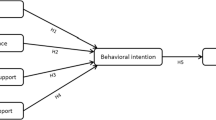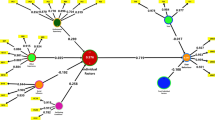Abstract
While the majority of studies so far have examined the effectiveness and benefits of electronic settlement applications, this study explores factors that affect the adoption and use of online mediation services. To this end, structural equation modeling analysis was applied to data obtained from users and mediators involved in an online mediated dispute. Subject perceptions regarding an overall mediation system including information technology and a human mediator were assessed. The findings suggest that while perceived usefulness of the information system explains the variance in attitude towards online mediation, the perceived usefulness of the mediator does not shape this attitude. Thus, mediators are being conceptualized as external to the service and their characteristics do not affect attitudes towards online mediation services, nor the intention to adopt it. This phenomenon is explained using biases in attribution.
Similar content being viewed by others
References
Abowd GD and Mynatt ED (2002). Charting past, present and future research in ubiquitous computing. In: Carroll, JM (eds) Human-Computer Interaction in the New Millennium, 513–535. ACM Press, New York, NY, USA
Ajzen I (1991). The theory of planned behavior. Organ Behav Hum Decis Processes 50(2): 179–211
Alter S (2000). Same words, different meanings: Are basic IS/IT concepts our self-imposed tower of Babel?. Commun AIS 3(10): 1–89
Carmel E, Herniter BC and Nunamaker JF (1993). Labor-management contract negotiation in an electronic meeting room: a case study. Group Decis Negot 2(1): 27–60
Carnevale PJ and Pruitt DG (1992). Negotiation and Mediation. Ann Rev Psychol 43: 531–582
Chin WW (1998). The Partial Least Squares approach for Structural Equation Modeling. In: Marcoulides, A (eds) Modern methods for business research, 295–336. Lawrence Erlbaum Associates, Mahwa, NJ
Chin WW (2002) PLS-Graph User’s Guide, Version 3.0. Soft Modelling Inc.
Clark E, Cho G and Hoyle A (2003). Online dispute resolution: present realities, pressing problems and future prospects. Int Rev Law Comput Technol 17(1): 7–25
Cramer RD, Bunce JD, Patterson DE and Frank IE (1988). Cross-Validation, bootstrapping, and Partial least-squares compared with multiple-regression in Conventional qsar studies. Quant Struct-Act Rel 7(1): 18–25
Davis FD (1989). Perceived usefulness, perceived ease of use and user acceptance of information technology. MIS Q 13(3): 319–340
Davis FD, Bagozzi RP and Warshaw PR (1989). User acceptance of computer technology: a comparison of two theoretical models. Manage Sci 35(8): 982–1003
Donahey MS (2000). Current development in online dispute resolution. Tomlinson, Zisko, Morsoli & Maser LLP, Palo Alto, CA, USA
Druckman D, Druckman JN and Arai T (2004). e-mediation: evaluating the impacts of an electronic mediator on negotiating behavior. Group Decis Negot 13(6): 481–511
Eagly AH and Chaiken S (1993). The psychology of attitudes. 1st edn. Harcourt Brace Jovanovich College Publishers (HBJ), Orlando, Florida, USA
Eason K (1988). Information technology and organizational change. Taylor and Francis, London, UK
Fornell C and Larcker DF (1981). Evaluating structural equation models with unobservable variables and measurement error. J Mark Res 18(1): 39–50
Fraser NM and Hipel KW (1981). Computer assistance in labor management negotiations. Interfaces 11(2): 22–29
Friedman R, Anderson C, Brett J, Olekalns M, Goates N and Lisco CC (2004). The positive and negative effects of anger on dispute resolution: evidence from electronically mediated disputes. J Appl Psychol 89(2): 369–376
Friedman RA and Currall SC (2003). Conflict escalation: dispute exacerbating elements of e-mail communication. Hum Relat 56(11): 1325–1347
Gefen D, Karahanna E and Straub DW (2003). Trust and TAM in online shopping: an integrated model. MIS Q 27(1): 51–90
Gefen D, Straub D and Boudreau M-C (2000). Structural equation modeling and regression: guidelines for research practice. Commun Assoc Information Syst 4(7): 1–77
Heider F (1958). The psychology of interpersonal relations. John Wiley and Sons, New York, NY, USA
Hornle J (2003). Online dispute resolution: the emperor’s new clothes? Benefits and pitfalls of online dispute resolution and its application to commercial arbitration. Int Rev Law Comput Technol 17(1): 27–37
Howitt D, Billig M, Cramer D, Edwards D, Kniveton B, Potter J and Radley A (1992). Social psychology: conflicts and continuities. 3rd edn. Open University Press, Philadelphia, USA
Jarke MM, Jelasi T and Shakun MF (1987). Mediator: towards a negotiation support system. Eur J Oper Res 31(3): 314–334
Karahanna E, Straub DW and Chervany NL (1999). Information technology adoption across time: a cross-sectional comparison of pre-adoption and post-adoption beliefs. MIS Q 23(2): 183–213
Legris P, Ingham J and Collerette P (2003). Why do people use information technology? A critical review of the technology acceptance model. Inf Manage 40(3): 191–204
Lim J, Gan B, Chang T-T (2002) A survey on NSS adoption intention, 35th Hawaii International Conference on System Sciences, IEEE, Hawaii
Marakas GM, Johnson RD and Palmer JW (2000). A theoretical model of differential social attributions toward computing technology: when the metaphor becomes the model. I J Hum-Compu St 52(4): 719–750
Meyer RS and First SM (2002). Advising potential defendants. In: Brand, N (eds) How ADR Works, pp 55–73. BNA Books, Washington, DC, USA,
Miller DT and Ross M (1975). Self-serving biases in the attribution of causality: facts or fiction?. Psychol Bull 82(2): 213–225
Moore DA, Kurtzberg TR, Thompson LL and Morris MW (1999). Long and short routes to success in electronically mediated negotiations: group affiliations and good vibrations. Organ Behav Hum Decis Processes 77(1): 22–43
Nadler J (2001). Electronically-mediated dispute resolution and e-commerce. Negot J 17(4): 333–347
Nass C and Moon Y (2000). Machines and mindlessness: social responses to computers. J Soc Issues 56(1): 81–103
Nunaly JC (1978). Psychometric theory. McGraw-Hill, New York, NY, USA
Sheppard BH (1983). Managers as inquisitors: some lessons from the law. In: Bazerman, MH and Lewicki, RJ (eds) Negotiating in Organizations. Sage, Beverly Hills, CA, USA
Straub DW (1989). Validating instruments in MIS research. MIS Q 13(2): 147–169
Thomas RD, Lu IRR, Cedzynski M (2005) Partial least squares: a critical review and a potential alternative. Administrative Sciences Association of Canada (ASAC) Conference, ASAC, Toronto, Ontario, Canada, 121–135
Turel O and Serenko A (2006). Satisfaction with mobile services in Canada: an empirical investigation. Telecommun Policy 30(5–6): 314–331
Turel O, Serenko A and Bontis N (2007). User acceptance of wireless short messaging services: deconstructing perceived value. Inf Manage 44(1): 63–73
Turel O, Yuan Y (Forthcomming-a) User acceptance of web-based Negotiation Support Systems: the role of perceived intention of the negotiating partner to negotiate online. Group Decis Negot. doi: 10.1007/s10726-006-9069-z
Turel O, Yuan Y (Forthcomming-b) You can’t shake hands with clenched fists: potential effects of trust assessments on the adoption of e-negotiation services. Group Decis Negot. doi:10.1007/s10726-007-9079-5
Turel O, Yuan Y (2005) Online negotiation services: benefits and challenges of users and service providers. Journal of Alternative Dispute Resolution, ICFAI University Press, October, 62–77
Venkatesh V and Davis FD (2000). A theoretical extension of the technology acceptance model: four longitudinal field studies. Manage Sci 46(2): 186–204
Venkatesh V, Morris MG, Davis GD and Davis FD (2003). User acceptance of information technology: toward a unified view. MIS Q 27(3): 425–478
Vetschera R, Kersten G, Koeszegi S User assessment of Internet-based negotiation support systems: an exploratory study. J Organ Comput Electronic Commerce (Forthcoming)
Yuan Y, Head M and Du M (2003). The effects of multimedia communication on web-based negotiation. Group Decis Negot 12(2): 89–109
Yuan Y, Suraga S, Rose JB and Archer NA (1998). Web-based negotiation support system. Int J Electron Markets 8(3): 13–17
Yuan Y, Turel O (Forthcoming) E-negotiations: bridging the practical divide-introduction to the special issue. Group Decis Negot. doi: 10.1007/s10726-007-9081-y
Author information
Authors and Affiliations
Corresponding author
Rights and permissions
About this article
Cite this article
Turel, O., Yuan, Y. & Rose, J. Antecedents of attitude towards online mediation. Group Decis Negot 16, 539–552 (2007). https://doi.org/10.1007/s10726-007-9085-7
Received:
Accepted:
Published:
Issue Date:
DOI: https://doi.org/10.1007/s10726-007-9085-7




